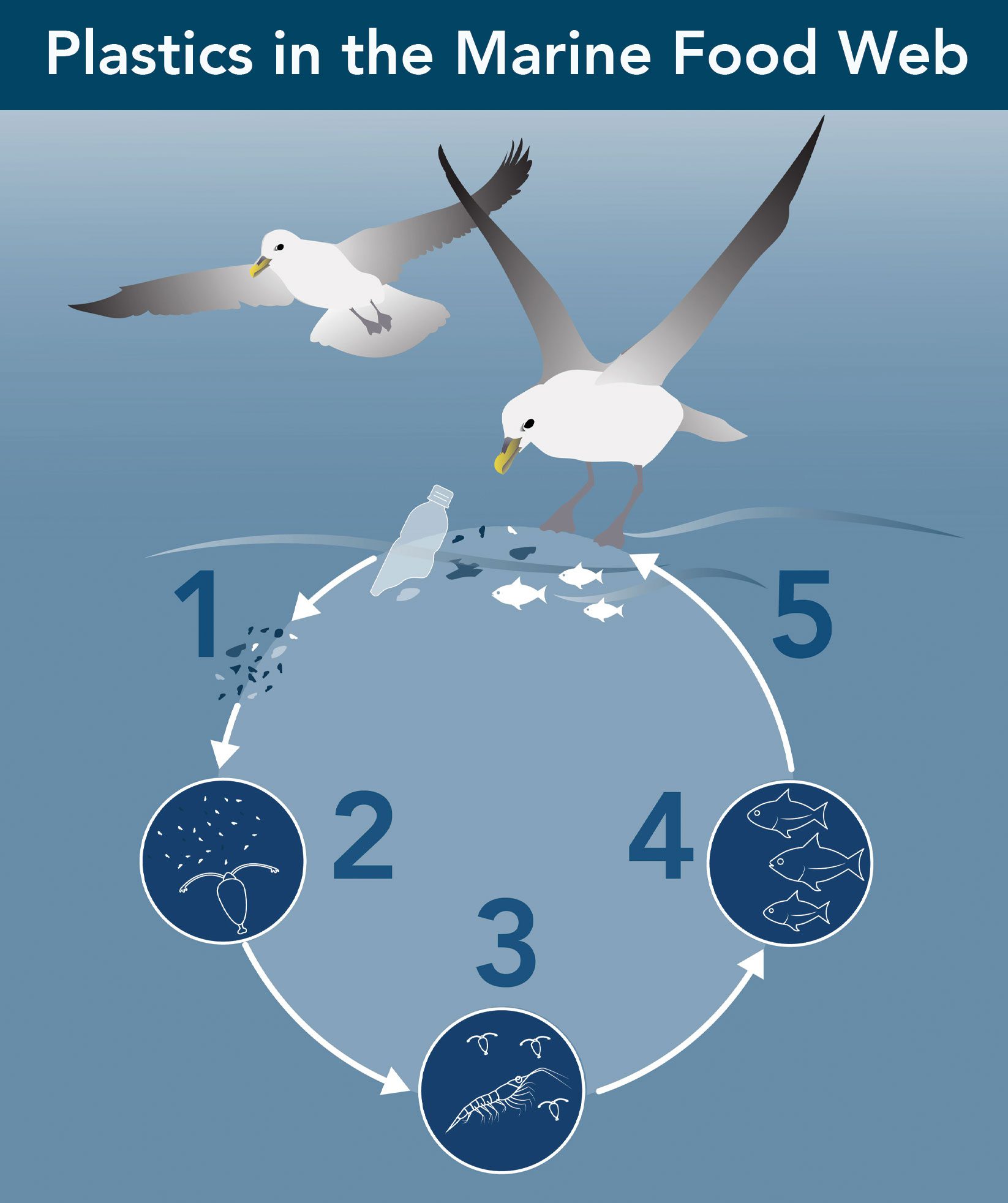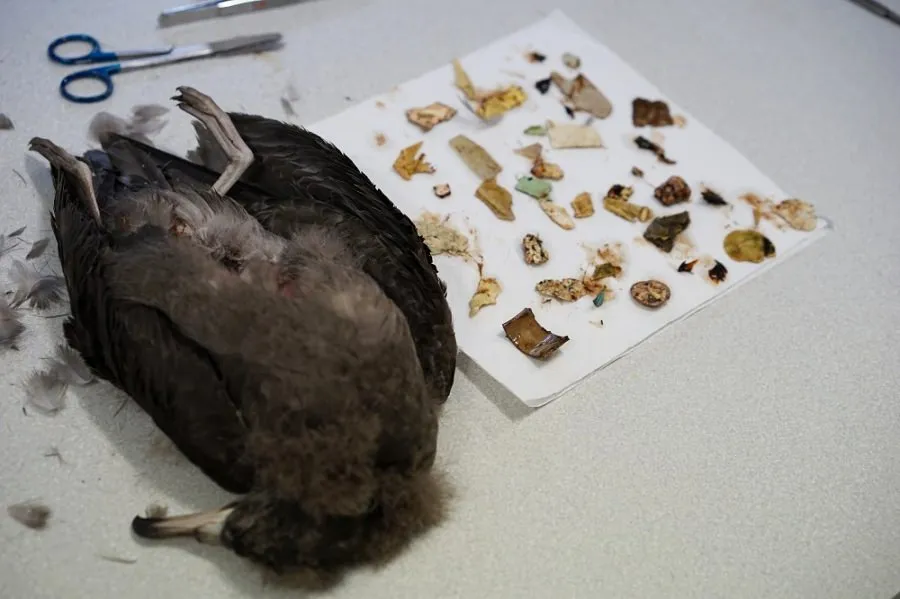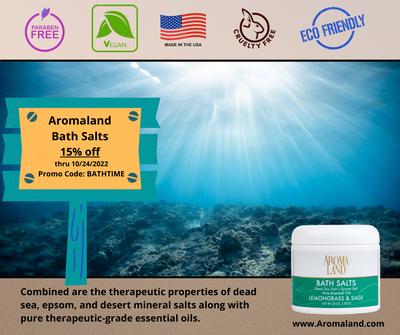Study: Most Of The Plastic Found In Seabirds' Stomachs Was Recycleable
Por um escritor misterioso
Last updated 07 julho 2024

In a study of great shearwaters, most of the plastic found in the birds was recyclable polyethylene. To the scientists, the preliminary results add to the growing pile of evidence that recycling is not the solution to our plastic pollution problem, and broader policy action is needed.

Seabirds that swallow ocean plastic waste have scarring in their stomachs – scientists have named this disease 'plasticosis

Plastic debris in 90% of seabirds' guts

A Hardy Seabird Is Helping to Detect Plastic Pollution in the Arctic

Plastic debris is altering the blood composition of seabirds

Seabirds Are Eating Plastic Litter In Our Oceans – But Not Only Where You'd Expect

Summer of Science - Plastic Poses a Growing Threat to Seabirds, Study Says

Midway Albatross an Icon of the Plastic Pollution Problem

By 2050, Almost Every Seabird Will Have Plastic In Its Stomach, NOVA

Plastic Pollution Threatens Survival of Seabirds - Study Finds

Seabirds are eating plastic litter in our oceans – but not only where you'd expect

7 Facts About Plastic That You Didn't Know
Recomendado para você
-
 Haze Piece codes December 202307 julho 2024
Haze Piece codes December 202307 julho 2024 -
 50 Color Combinations You Need to Use in 202307 julho 2024
50 Color Combinations You Need to Use in 202307 julho 2024 -
 Sea Piece Codes (December 2023) - Pro Game Guides07 julho 2024
Sea Piece Codes (December 2023) - Pro Game Guides07 julho 2024 -
 Sea Piece Codes07 julho 2024
Sea Piece Codes07 julho 2024 -
 Roblox Sea Piece Codes (March 2023)07 julho 2024
Roblox Sea Piece Codes (March 2023)07 julho 2024 -
 Five Benefits of Taking a Warm Salt Bath - Aromaland07 julho 2024
Five Benefits of Taking a Warm Salt Bath - Aromaland07 julho 2024 -
 Meme Sea Codes - Try Hard Guides07 julho 2024
Meme Sea Codes - Try Hard Guides07 julho 2024 -
 ALL NEW *SECRET* UPDATE CODES in SEA PIECE CODES! (Sea Piece Codes) SEA PIECE CODES ROBLOX07 julho 2024
ALL NEW *SECRET* UPDATE CODES in SEA PIECE CODES! (Sea Piece Codes) SEA PIECE CODES ROBLOX07 julho 2024 -
 ALL NEW *SECRET* UPDATE CODES in SEA PIECE CODES! (Sea Piece Codes) SEA PIECE CODES ROBLOX07 julho 2024
ALL NEW *SECRET* UPDATE CODES in SEA PIECE CODES! (Sea Piece Codes) SEA PIECE CODES ROBLOX07 julho 2024 -
 NEW* ALL WORKING SECOND SEA UPDATE CODES FOR SEA PIECE! ROBLOX SEA PIECE CODES07 julho 2024
NEW* ALL WORKING SECOND SEA UPDATE CODES FOR SEA PIECE! ROBLOX SEA PIECE CODES07 julho 2024
você pode gostar
-
Buy XL Pack07 julho 2024
-
 Boneca Bebe Reborn Menina 100% Silicone 55 Cm - 12x S/ Juros07 julho 2024
Boneca Bebe Reborn Menina 100% Silicone 55 Cm - 12x S/ Juros07 julho 2024 -
 Roupa Boneca Barbie Kit Com 52 Acessórios07 julho 2024
Roupa Boneca Barbie Kit Com 52 Acessórios07 julho 2024 -
AUF - Selección - AUF - Selección Uruguaya de Fútbol07 julho 2024
-
![Spoilers] Gakusen Toshi Asterisk - Episode 6 [Discussion]](https://i.pinimg.com/originals/e4/c7/12/e4c71225294806bda7cff75cd56ff703.jpg) Spoilers] Gakusen Toshi Asterisk - Episode 6 [Discussion]07 julho 2024
Spoilers] Gakusen Toshi Asterisk - Episode 6 [Discussion]07 julho 2024 -
Os cassinos online são seguros? O hacker ético e influencer Gabriel Pa07 julho 2024
-
 Anime EDENS ZERO Rebecca Bluegarden Cosplay Pendant Love Necklace Prop Accessories07 julho 2024
Anime EDENS ZERO Rebecca Bluegarden Cosplay Pendant Love Necklace Prop Accessories07 julho 2024 -
 Abaixo-assinado · Quero que façam uma continuação de Death Note,com agostinho carrara como dublador do Ryuk ·07 julho 2024
Abaixo-assinado · Quero que façam uma continuação de Death Note,com agostinho carrara como dublador do Ryuk ·07 julho 2024 -
 Stream XD meme slowed down by •°{Moon🌙}•_•{Faith ✨}°• \(◕‿◕)/07 julho 2024
Stream XD meme slowed down by •°{Moon🌙}•_•{Faith ✨}°• \(◕‿◕)/07 julho 2024 -
 2023: A watershed year for action on deforestation07 julho 2024
2023: A watershed year for action on deforestation07 julho 2024


